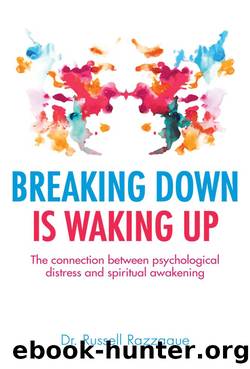Breaking Down is Waking up: Can Psychological Suffering be a Spiritual Gateway? by Russell Razzaque

Author:Russell Razzaque
Language: eng
Format: epub
Tags: Breaking Down is Waking up: Can Psychological Suffering be a Spiritual Gateway?
ISBN: 9781780286662
Publisher: Watkins Publishing Limited
Published: 2014-03-10T16:00:00+00:00
Chapter 9
Awakening through Suffering
‘Only when all our hold on life is troubled, only in spiritual terror can the truth come through the broken mind.’
W B Yeats
SOME LIFE EXPERIENCES are so intense and severe that most people who experience them will have a major breakdown as a result. Child sex abuse is one such example: some studies have reported rates of childhood physical and sexual abuse in up to 50% of adolescents and adults with a psychiatric diagnosis. Trauma and abuse in childhood is, therefore, a key predisposing factor to major mental illness. This may take a variety of forms, from neglect to deprivation to high levels of intra-family conflict. Of course, major mental illness can also develop in people who have experienced no such backgrounds and that is when additional predisposing factors will come into play like genetic influences and growth and development of the foetus in the uterus. In most people a combination of these factors underpins the underlying vulnerability.
When trying to understand the early environmental triggers, like a lot of psychiatrists I spend some time attempting to discover exactly what those early experiences were and how they may have impacted on the sufferer psychologically. Every event we encounter in our lives is met with a psychological reaction, and in childhood this reaction is often reflexive. So, for example, a child who is physically abused on a regular basis by her carers may well start to associate this experience of violence with her own sense of self. Abusive relationships or self-harm may then follow in adulthood as a consequence. The tragic idea that establishes itself is that the ‘I’ is someone who is abused.
This is, indeed, how depression occurs. A study in 2004 involving nearly 10,000 people examined the relationship between adverse childhood experiences – termed ACEs – and depression in later life. They used a score – the ACE score – to quantify the extent of trauma or abuse a child experienced, and they found a clear correlation between that score and levels of depression in adulthood. ‘We found a strong, dose–response relationship between the ACE score and the probability of lifetime and recent depressive disorders.’ In other words, the greater the trauma, the more likely it was that the child would grow up to become depressed. This shows the extent to which the concept of ‘I’ is a story that evolves out of the experiences of our earlier years, and when this ‘I’ is poisoned from the outset, a high risk of mental illness becomes built into the system. The person will then grow up with a propensity to attach any subsequent negative events to this ‘I’ too – while avoiding positive ones. So, if two members of the family row, it quickly starts to feel like ‘my fault’, or if, on the other hand, the person performs an act of kindness, it is quickly rationalized away, ‘Oh, anyone would have done the same.’
It’s not just abuse or trauma that can lead to this pattern of thinking, of course.
Download
This site does not store any files on its server. We only index and link to content provided by other sites. Please contact the content providers to delete copyright contents if any and email us, we'll remove relevant links or contents immediately.
Should I Stay or Should I Go? by Ramani Durvasula(6785)
Why We Sleep: Unlocking the Power of Sleep and Dreams by Matthew Walker(5642)
Fear by Osho(4085)
Flow by Mihaly Csikszentmihalyi(4052)
Rising Strong by Brene Brown(3781)
Why We Sleep by Matthew Walker(3772)
Too Much and Not the Mood by Durga Chew-Bose(3694)
How to Change Your Mind by Michael Pollan(3678)
The Hacking of the American Mind by Robert H. Lustig(3580)
Lost Connections by Johann Hari(3455)
He's Just Not That Into You by Greg Behrendt & Liz Tuccillo(3302)
Evolve Your Brain by Joe Dispenza(3051)
What If This Were Enough? by Heather Havrilesky(2945)
Resisting Happiness by Matthew Kelly(2887)
Crazy Is My Superpower by A.J. Mendez Brooks(2860)
The Courage to Be Disliked by Ichiro Kishimi & Fumitake Koga(2797)
The Book of Human Emotions by Tiffany Watt Smith(2771)
Descartes' Error by Antonio Damasio(2731)
In Cold Blood by Truman Capote(2685)
